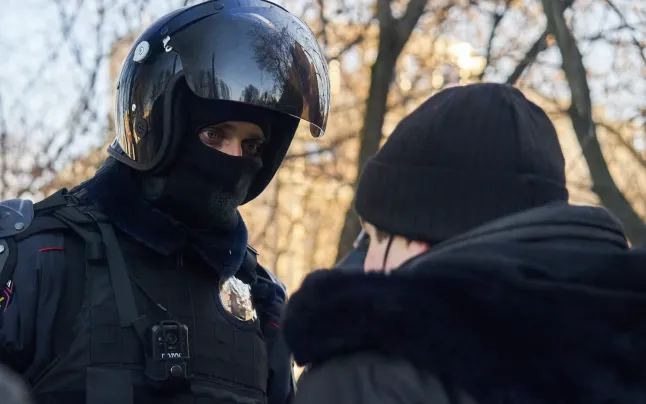The International Institute for Nonviolent Action, Novact, presents the study 'Don't Call Me a Terrorist When I'm Not', which has analyzed false accusations of terrorism that have occurred in the Euro-Mediterranean region and their consequences.
The use of falsely accusing non-violent activists from any field, such as social and political struggles, humanitarian aid, and even environmental causes, as well as anti-authoritarian individuals, journalists, and human rights defenders, has become a common strategy by the autocratic wave that is sweeping the Euro-Mediterranean region.
The far-right and authoritarian regimes are gaining strength and normalizing this type of accusatory action, which serves only to silence opposition. Moreover, false accusations of terrorism can have a negative impact on the growth of the pro-democratic movement, as they seek to erase opinions and speeches based on the defense and values of democratic freedom. The fear and suspicion they generate reinforce their control of power and hinder democratic movements.
Following the attacks on the Twin Towers in New York on September 11, 2001, states placed terrorism at the center of the international agenda, and a large number of governments worldwide established new legislative frameworks that involved increased control, surveillance, and restriction of certain liberties for their populations. This inclination, in some countries, has expanded with the emergence of Covid-19.
A study highlighting one of democracy's threats
The International Institute for Nonviolent Action, Novact, in collaboration with the organizations Suds and Irídia, has produced the report 'Don't Call Me a Terrorist When I'm Not'. The document analyzes these false accusations that have occurred in the Euro-Mediterranean region and examines how they contribute to the growth of authoritarianism and the repression of pro-democratic movements and human rights defenders.
The author of the report is journalist and political scientist Ricard Gonzalez, and it was presented during the third edition of the 'United Nations Counter-Terrorism Week', held in New York.
The study is structured according to analyses of cases involving state actors in different countries, such as Algeria, Egypt, Morocco, Iraq, Palestine, Tunisia, Turkey, Spain, and additionally, other member states of the European Union, including Austria, France, Poland, and Germany. It concludes with a series of policy proposals to combat the issue.
In European Union countries, it is the Muslim communities that bear the brunt among individuals belonging to peaceful movements, political parties, or civil society organizations who are accused and criminalized for their ideology. Certain media outlets, far-right groups, and parties specifically target these individuals, with even greater emphasis if they are part of non-violent Islamist movements or hold conservative opinions.
Circumstances and current situations in the analyzed countries
Each country has a different situation. Egypt, Turkey, and Israel-Palestine are the countries with the highest number of victims, both in absolute and relative terms. Tens of thousands of people in these countries face false accusations of terrorism based on flimsy evidence.
In Egypt, for example, anyone who is openly critical or dissident, regardless of their ideology, is considered a "terrorist." In Turkey, the Kurdish community and alleged members of the religious movement led by Fetullah Gülen are the most affected. The Palestinian population suffers the worst consequences in their region and at the hands of Israel.
In Tunisia and Algeria, unlike the previously mentioned countries, this trend has emerged recently. Over the past two years, both countries have seen an increase in terrorism investigations for political reasons. Finally, if we focus on Spain and other EU member states, while the number of victims may be lower, this issue is still on the rise.
The Gag Law in Spain
In Spain, an example of a situation within the framework of security legislation to suppress dissent occurred in 2015 with the approval of the Gag Law, which restricts and violates the right to protest and freedom of expression. Additionally, various modifications to the Penal Code were made to expand the offenses related to acts of terrorism.
However, it wasn't until 2017 that the government unjustly and biasedly accused activists, mostly members of Catalan independence groups, following the illegal self-determination referendum in Catalonia, which was declared unconstitutional by the Constitutional Court. Moreover, in recent years, there have been high-profile cases of unfounded accusations under the Gag Law, such as the anti-terrorism investigation against the Tsunami Democratic group, the imprisonment of rapper Pablo Hasél, or the case of Mallorcan artist Valtònyc.
Serious human rights violations
Unfortunately, the consequences for those falsely accused are "very serious" punishments, as described by Novact, including lengthy prison sentences and even the death penalty. When an individual is under investigation, the most common outcome is immediate detention.
As highlighted in the report, in some cases, "charges are dropped during the investigation, or the victims are acquitted, but they have already suffered damage in terms of social stigmatization, which is rarely repaired."
Therefore, due to the changes in anti-terrorism legislation in these countries, the state's ability to control its population has increased. The most contradictory aspect is that these measures have not resulted in stronger protection against terrorist threats. Instead, society has witnessed a regression of individual and collective freedoms.
In conclusion, as emphasized by the founder and co-director of Novact, Luca Gervasoni, in the report's preface, "collective actions by democratic governments, international cooperation institutions, and non-governmental international organizations are essential to reverse the authoritarian tide".









Add new comment